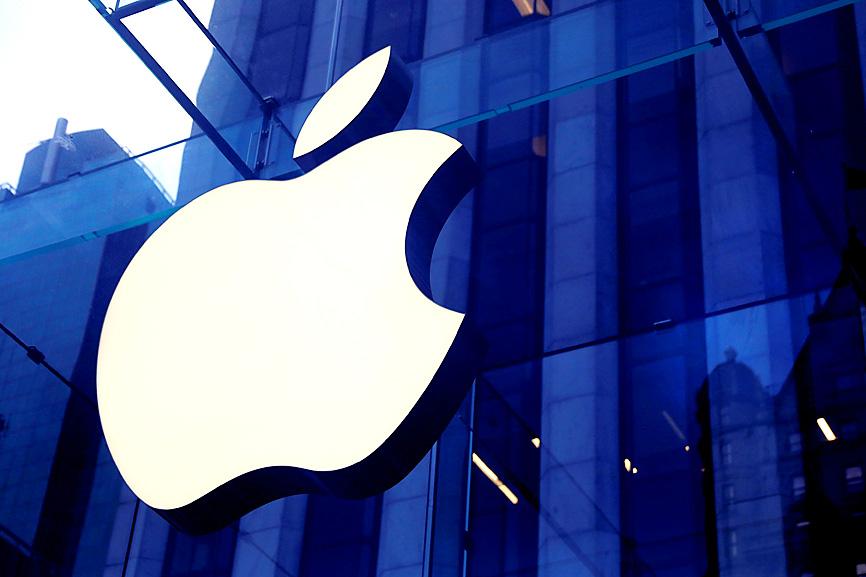Apple Inc on Tuesday lost its copyright claims against a Florida company that makes “virtual iPhones” used by security researchers to test for vulnerabilities to its system.
Apple claimed that Corellium LLC copied the operating system, graphical user interface and other aspects of the devices without permission.
It accused Corellium of acting under the guise of helping discover bugs in the iPhone’s operating system, but then selling the information “on the open market to the highest bidder.”

Photo: Reuters
Corellium’s actions fell under an exception to copyright law because it “creates a new, virtual platform for iOS and adds capabilities not available on Apple’s iOS devices,” District Court Judge Rodney Smith in West Palm Beach said in his ruling.
That Corellium sells its product “does not undermine its fair-use defense, particularly considering the public benefit of the product,” Smith said.
Apple has a “bounty program” where it rewards so-called white-hat hackers who discover flaws in its system.
The Cupertino, California-based company argued that the Corellium product went far beyond that, although Corellium said that it evaluates potential customers and rejects some.
Corellium said its customers are government agencies, financial institutions and security researchers, and accused Apple of trying to control security research to limit what the public learns about vulnerabilities.
Apple had been in talks to buy the company, but the two sides could not agree on a price, Smith said.
Apple sued a year later.
Corellium’s virtual product is used on a desktop computer and cannot make phone calls, send text messages, access iTunes or do any of the other things an iPhone can.
“There is evidence in the record to support Corellium’s position that its product is intended for security research and, as Apple concedes, can be used for security research,” the judge said. “Further, Apple itself would have used the product for internal testing had it successfully acquired the company.”
Officials with the two companies did not immediately respond to queries seeking comment.
Apple argued that the case is similar to the billion-dollar dispute between Oracle Corp and Alphabet Inc’s Google unit, in which an appeals court rejected Google’s arguments that it had the right to copy Oracle code for inclusion into the Android operating system.
The US Supreme Court is considering the issue.
Smith said that the two cases are not comparable — Corellium transforms iOS and adds new content, and it is not a direct competitor.
It was instead more like the case in which an appeals court ruled that Google’s creation of digital copies of books and showing snippets in search results was a fair use of copyrighted works, Smith said.
The judge said that Corellium might still be in breach of the US Digital Millennium Copyright Act, which prohibits tools to circumvent security measures, so he declined to dismiss that aspect of the case at this stage.
He ordered the two sides to submit a status report by Jan. 11 to determine how the case proceeds.

Anna Bhobho, a 31-year-old housewife from rural Zimbabwe, was once a silent observer in her home, excluded from financial and family decisionmaking in the deeply patriarchal society. Today, she is a driver of change in her village, thanks to an electric tricycle she owns. In many parts of rural sub-Saharan Africa, women have long been excluded from mainstream economic activities such as operating public transportation. However, three-wheelers powered by green energy are reversing that trend, offering financial opportunities and a newfound sense of importance. “My husband now looks up to me to take care of a large chunk of expenses,

SECTOR LEADER: TSMC can increase capacity by as much as 20 percent or more in the advanced node part of the foundry market by 2030, an analyst said Taiwan Semiconductor Manufacturing Co (TSMC, 台積電) is expected to lead its peers in the advanced 2-nanometer process technology, despite competition from Samsung Electronics Co and Intel Corp, TrendForce Corp analyst Joanne Chiao (喬安) said. TSMC’s sophisticated products and its large production scale are expected to allow the company to continue dominating the global 2-nanometer process market this year, Chiao said. The world’s largest contract chipmaker is scheduled to begin mass production of chips made on the 2-nanometer process in its Hsinchu fab in the second half of this year. It would also hold a ceremony on Monday next week to

TECH CLUSTER: The US company’s new office is in the Shalun Smart Green Energy Science City, a new AI industry base and cybersecurity hub in southern Taiwan US chip designer Advanced Micro Devices Inc (AMD) yesterday launched an office in Tainan’s Gueiren District (歸仁), marking a significant milestone in the development of southern Taiwan’s artificial intelligence (AI) industry, the Tainan City Government said in a statement. AMD Taiwan general manager Vincent Chern (陳民皓) presided over the opening ceremony for the company’s new office at the Shalun Smart Green Energy Science City (沙崙智慧綠能科學城), a new AI industry base and cybersecurity hub in southern Taiwan. Facilities in the new office include an information processing center, and a research and development (R&D) center, the Tainan Economic Development Bureau said. The Ministry

ADVERSARIES: The new list includes 11 entities in China and one in Taiwan, which is a local branch of Chinese cloud computing firm Inspur Group The US added dozens of entities to a trade blacklist on Tuesday, the US Department of Commerce said, in part to disrupt Beijing’s artificial intelligence (AI) and advanced computing capabilities. The action affects 80 entities from countries including China, the United Arab Emirates and Iran, with the commerce department citing their “activities contrary to US national security and foreign policy.” Those added to the “entity list” are restricted from obtaining US items and technologies without government authorization. “We will not allow adversaries to exploit American technology to bolster their own militaries and threaten American lives,” US Secretary of Commerce Howard Lutnick said. The entities